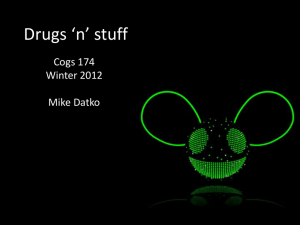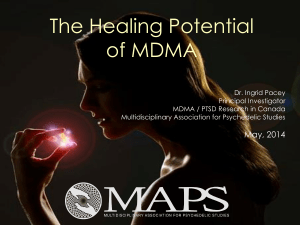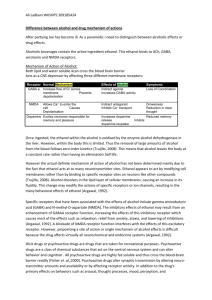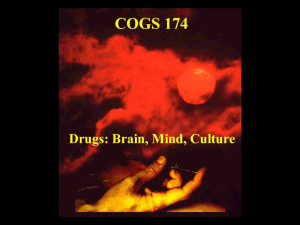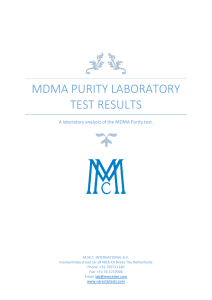Modification of MDMA-Induced Hyperthermia by Other Recreational Drugs Michael A. Taffe
advertisement
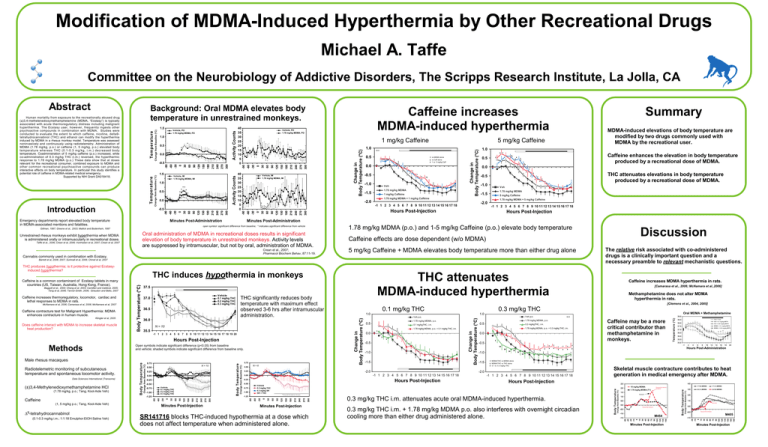
Modification of MDMA-Induced Hyperthermia by Other Recreational Drugs Michael A. Taffe Committee on the Neurobiology of Addictive Disorders, The Scripps Research Institute, La Jolla, CA Background: Oral MDMA elevates body temperature in unrestrained monkeys. 0.0 * -0.5 -1.0 -1.5 * * * * * Veh 1.78 mg/kg MDMA 1 mg/kg Caffeine 1.0 *# 0.5 # *# * * -0.5 -1.0 -1.5 -2.0 Hours Post-Injection Caffeine enhances the elevation in body temperature produced by a recreational dose of MDMA. *# * 0.0 1.78 mg/kg MDMA + 1 mg/kg Caffeine -1 1 2 3 4 5 6 7 8 9 10 11 12 13 14 15 16 17 18 * * * * * * * THC attenuates elevations in body temperature produced by a recreational dose of MDMA. * Veh 1.78 mg/kg MDMA 5 mg/kg Caffeine 1.78 mg/kg MDMA + 5 mg/kg Caffeine -1 1 2 3 4 5 6 7 8 9 10 11 12 13 14 15 16 17 18 Hours Post-Injection Caffeine effects are dose dependent (w/o MDMA) 5 mg/kg Caffeine + MDMA elevates body temperature more than either drug alone Barrett et al, 2006; 2007; Sumnall et al, 2006; Chinet et al, 2007 6 7 8 9 10 11 12 13 14 15 16 17 18 19 20 Hours Post-Injection Δ9-tetrahydrocannabinol (0.1-0.3 mg/kg i.m.; 1:1:18 Emulphor:EtOH:Saline Veh) Minutes Post-Injection 0.00 -1.0 -1.5 -1 1 2 3 4 5 6 7 8 9 10 11 12 13 14 15 16 17 18 Hours Post-Injection -0.25 Vehicle 0.3 mg/kg THC 0.3 mg/kg SR SR + THC 300 270 240 90 60 30 210 * SR and SR+THC differ from THC alone -1.25 180 -1.00 150 -0.75 120 -0.50 0 300 270 240 210 180 150 90 120 (1, 5 mg/kg p.o.; Tang, Kool-Aide Veh) 60 -1.25 -0.5 -2.0 0.25 -30 -1.00 N=6 0.50 -60 -0.75 0.75 -90 Vehicle 0.1 mg/kg THC 0.2 mg/kg THC 0.3 mg/kg THC Change from Baseline ( C) -0.50 Body Temperature -0.25 30 Caffeine 0.00 -90 (1.78 mg/kg, p.o.; Tang, Kool-Aide Veh) 0.25 0 ( )3,4-Methylenedioxymethamphetamine HCl N = 10 0.50 -30 Data Sciences International (Transoma) 0.75 -60 Radiotelemetric monitoring of subcutaneous temperature and spontaneous locomotor activity. Change from Baseline ( C) Male rhesus macaques Body Temperature Methods Open symbols indicate significant difference (p<0.05) from baseline and vehicle; shaded symbols indicate significant difference from baseline only. 0.0 Minutes Post-Injection SR141716 blocks THC-induced hypothermia at a dose which does not affect temperature when administered alone. 0.0 * * * -0.5 * # # # -1.0 -1.5 # # # # * # * # *# * # * # * MDMA + 0.1 mg/kg METH * * 37.0 MDMA + 0.32 mg/kg METH # 36.5 # # 36.0 35.5 35.0 -1 # 2 4 6 8 10 12 14 16 18 Hours Post-Administration 20 # vs MDMA alone * MDMA/THC MDMA/THC vs THC alone # 0.1 vs 0.3 mg/kg THC -2.0 Veh + 0.32 mg/kg METH 37.5 -1 1 2 3 4 5 6 7 8 9 10 11 12 13 14 15 16 17 18 Skeletal muscle contracture contributes to heat generation in medical emergency after MDMA. Hours Post-Injection 0.3 mg/kg THC i.m. attenuates acute oral MDMA-induced hyperthermia. 0.3 mg/kg THC i.m. + 1.78 mg/kg MDMA p.o. also interferes with overnight circadian cooling more than either drug administered alone. 4.5 2.5 2.0 1.5 10 mg/kg MDMA 1.78 mg/kg MDMA (T1) Seizure-like behavior abolished Diazepam 1.0 0.5 0.0 Seizure-like behavior -0.5 -1.0 -1.5 M454 Minutes Post-Injection 3.5 1.7 S(+)MDMA 1.7 (+/-)MDMA 2.4 (+/-)MDMA 2.4 S(+)MDMA 2.5 1.5 Recovery 0.5 -0.5 -1.5 Seizure-like behavior M405 Minutes Post-Injection 180 5 1.78 mg/kg MDMA, p.o. + 0.3 mg/kg THC, i.m. 38.0 165 4 0.3 mg/kgTHC, i.m. Veh + Veh Veh + 0.1 mg/kg METH 135 150 3 0.5 38.5 120 2 1.78 mg/kg MDMA, p.o. + 0.1 mg/kg THC, i.m. Caffeine may be a more critical contributor than methamphetamine in monkeys. 1.78 mg/kg MDMA, p.o. 90 105 -1 1 0.1 mg/kgTHC, i.m. 39.0 N=5 75 35.5 1.78 mg/kg MDMA, p.o. Veh, p.o. Oral MDMA + Methamphetamine 45 60 N = 10 0.5 Veh, p.o. 1.0 0.3 mg/kg THC 30 36.0 1.0 0.1 mg/kg THC 0 15 36.5 [Clemens et al., 2004, 2005] -15 Does caffeine interact with MDMA to increase skeletal muscle heat production? THC significantly reduces body temperature with maximum effect observed 3-6 hrs after intramuscular administration. -30 Klingler et al, 2005 37.0 Methamphetamine does not alter MDMA hyperthermia in rats. Change from Baseline ( C) Caffeine contracture test for Malignant Hyperthermia: MDMA enhances contracture in human muscle. Vehicle 0.1 mg/kg THC 0.2 mg/kg THC 0.3 mg/kg THC [Camarasa et al., 2006; McNamara et al.,2006] Body Temperature McNamara et al, 2006; Camarasa et al, 2006; McNamara et al, 2007 37.5 Caffeine increases MDMA hyperthermia in rats. Temperature ( C) Caffeine increases thermoregulatory, locomotor, cardiac and lethal responses to MDMA in rats. THC attenuates MDMA-induced hyperthermia Change in Body Temperature ( C) Baggott et al., 2000; Cheng et al. 2003; Camilleri and Caldicot, 2005; Teng et al, 2006; Tanner-Smith, 2006; Giraudon and Bello, 2007 Body Temperature ( C) Caffeine is a common contaminant of Ecstasy tablets in many countries (US, Taiwan, Australia, Hong Kong, France). THC induces hypothermia in monkeys Change in Body Temperature ( C) THC produces hypothermia; is it protective against Ecstasyinduced hyperthermia? The relative risk associated with co-administered drugs is a clinically important question and a necessary preamble to relevant mechanistic questions. -60 -45 -30 -15 0 15 30 45 60 75 90 105 120 135 150 Cannabis commonly used in combination with Ecstasy. Discussion Change from Baseline ( C) Crean et al., 2007; Pharmacol Biochem Behav, 87:11-19. 1.78 mg/kg MDMA (p.o.) and 1-5 mg/kg Caffeine (p.o.) elevate body temperature Body Temperature Taffe et al., 2006; Crean et al, 2006; VonHuben et al, 2007; Crean et al, 2007 MDMA alone * vs vs Caff alone # 1 vs 5 mg/kg Caff 300 270 240 210 180 Oral administration of MDMA in recreational doses results in significant elevation of body temperature in unrestrained monkeys. Activity levels are suppressed by intramuscular, but not by oral, administration of MDMA. Unrestrained rhesus monkeys exhibit hyperthermia when MDMA is administered orally or intramuscularly in recreational doses. Change in Body Temperature ( C) 300 270 240 210 180 120 90 60 30 0 150 150 300 270 240 210 180 150 120 90 60 30 0 -30 -60 open symbol: significant difference from baseline; * indicates significant difference from vehicle Gillman, 1997; Greene et al., 2003; Mallick and Bodenham, 1997 5 mg/kg Caffeine N=5 0.5 MDMA-induced elevations of body temperature are modified by two drugs commonly used with MDMA by the recreational user. Minutes Post-Administration Minutes Post-Administration Emergency departments report elevated body temperature in MDMA-associated mentions and fatalities. 1.0 -2.0 * * *** 120 * 90 * * **** 0.0 -0.5 * 60 * 30 0.5 ** Vehicle, IM 1.78 mg/kg MDMA, IM 0 Activity Counts 1.0 -30 300 270 240 210 180 150 120 90 60 30 0 Vehicle, IM 1.78 mg/kg MDMA, IM 40 35 30 25 20 15 10 5 0 -30 1.5 -30 -60 -0.5 -90 0.0 -60 * 1 mg/kg Caffeine -60 * 0.5 Vehicle, PO 1.78 mg/kg MDMA, PO -90 1.0 40 35 30 25 20 15 10 5 0 -90 Activity Counts Change from Baseline ( C) Vehicle, PO 1.78 mg/kg MDMA, PO -90 Introduction 1.5 Change from Baseline ( C) Temperature Temperature Human mortality from exposure to the recreationally abused drug ( )3,4-methelenedioxymethamphetamine (MDMA, Ecstasy ) is typically associated with acute thermoregulatory distress including malignant hyperthermia. The Ecstasy user, however, frequently ingests other psychoactive compounds in combination with MDMA. Studies were conducted to evaluate the extent to which caffeine, nicotine, delta9tetrahydrocannabinol (THC) and ethanol can modify the hyperthermia induced by MDMA in a rhesus monkey model. Temperature was assessed noninvasively and continuously using radiotelemetry. Administration of MDMA (1.78 mg/kg, p.o.) or caffeine (1, 5 mg/kg, p.o.) elevated body temperature whereas THC (0.1-0.3 mg/kg, i.m.) decreased body temperature. Coadministration of 5 mg/kg caffeine (p.o.) increased, while co-administration of 0.3 mg/kg THC (i.m.) reversed, the hyperthermic response to 1.78 mg/kg MDMA (p.o.) These data show that at doses relevant for the recreational consumer, combined exposure to MDMA and other common recreational psychoactive compounds can produce interactive effects on body temperature. In particular this study identifies a potential role of caffeine in MDMA-related medical emergency. Supported by NIH Grant DA018418. Summary Caffeine increases MDMA-induced hyperthermia Change in Body Temperature ( C) Abstract
